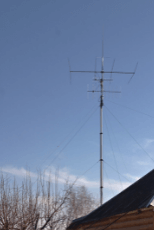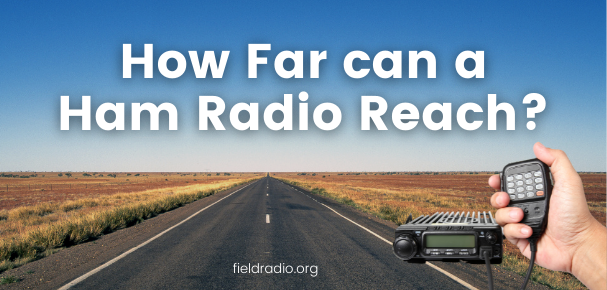Does your TV freeze suddenly when you are watching your favorite show? Or maybe you hear muffled voices with the picture breaking up?
These are signs of a ham radio interfering with your TV’s reception. You may not have one of these radios at home, but what if your neighbor does? It’s because of the signals from their radio that keep interfering with your TV’s reception, and as a result, you see distorted pictures and hear muffled voices.
Why does ham radio interfere with a TV’s reception?
 If radio amateurs work according to their licensing terms, why is it that their signals keep interfering with your TV? It’s because of the radio system they use. Poor quality connectors and cables often create these interferences to televisions.
If radio amateurs work according to their licensing terms, why is it that their signals keep interfering with your TV? It’s because of the radio system they use. Poor quality connectors and cables often create these interferences to televisions.
In fact, your neighbor who is a radio amateur may not be aware of this problem if you don’t go and tell him!
All radio amateurs must operate within the parameters set by the state government, but they should also check whether the connectors and cables that they are using are of high quality or not. Using new and branded cables won’t create interferences to your TV’s reception.
How does the interference take place?
The signal interference that your television picks up due to a nearby radio amateur transmission is called a breakthrough. Breakthroughs are more common in houses that have boosters or amplifiers.
A few more reasons that may cause the interference with your TV’s reception are poor-quality cables between various appliances and poor connections in the TV’s aerial system.
Therefore, in addition to asking the radio amateur to check his cables and connectors, you should also see whether the cables of the appliances in your home are in good condition or not.
Moreover, you can talk to your neighbor about whether he is working within the radio’s licensing terms. If he is, don’t hesitate to ask for the license. Sometimes, teenagers like to fool around with old radio systems without realizing that they could create disturbances in the TV receptions of their neighbors.
Symptoms of bad reception
Muffled voices and distorted picture quality aren’t the only two symptoms of a ham radio interfering with your TV reception. A few more symptoms that you need to keep in mind are as follows:
- Temporary loss of TV signal
- No sound from the TV
- TV getting switched off automatically
- The video does not match with the audio in all the channels
- Your TV turns on but there is no picture
- You hear an echo from your TV’s speaker
Transmitter interference

Ham radios around your house may cause interferences with your TV’s reception. Inadequate shielding, corroded wires, or insufficient filtering can lead to transmitter interferences.
Here’s what you should do if you have doubts about your neighbor’s radio messing up your TV’s signal:
- Switch on the TV and see whether it is experiencing any of the above symptoms or not.
- If it does, try unplugging some of the other appliances in your room. Sometimes, appliances like microwaves or cordless telephones may disrupt your TV’s signal. Make sure you rule out these appliances before you head over to your neighbor.
- Unplug one appliance at a time and check whether your TV is receiving proper signal. This would help you isolate the appliance that may disturb the TV’s reception.
- Sometimes, appliances pick up the signal from the nearby ham radio and mess up your TV’s signal. If you are able to identify the appliance, switch it off and unplug its cable. The TV should receive proper signals and not create any disturbances.
However, if none of the appliances are blocking your TV’s signal, it’s better to talk to the radio amateur. Ask him to check his connectors and cables thoroughly.
In most cases, pests chew or bite the external cables outside the house without the radio amateur knowing. This causes the radio signals to go haywire, and in turn, disrupt your TV’s reception.
How to block ham radio signal interference to your TV?
Here are a few things that you can do at home to block ham radio signal interferences to your TV:
- Check the entire cable that brings video and audio signals to your television. See if there are any scuff marks or broken ends. If you notice any problem with the wire, consider changing it.
- Move wireless-frequency devices away from your TV, such as cell phones and radios. Your TV might accidentally pick up their signals and transmit the audio that it receives from these devices.
- Don’t keep metal objects near your TV. Metal usually reflects wireless signals and interferes with your TV’s audio and video reception.
- Connect your television to an amplifier. Make sure you use a new cable to connect the amplifier and the antenna. This would allow the TV’s antenna to pick up signals even if the TV is far away from the amplifier.
On the other hand, you should also talk to your neighbor regarding the interference. Here are some tweaks that can stop the signal disruptions:
- Ask your neighbor to pay attention to routing. Maybe he didn’t route a couple of signals properly, causing your TV’s reception to suffer from frequent interruptions. You can also ask him to keep the cables close to a concrete floor to reduce their chances of affecting your TV’s antenna.
- Advise him to use cables that come with heavy-gauge shields. Cables with braided copper shields provide better routing than drain wire shield cables.
- He should also double-check whether all his connectors are in good condition or not. Sometimes, even a few cracks or chips in the connector may cause the signals to interrupt your TV’s reception.
Finally, you can install RFI filters near your TV’s antenna. RFI filters are efficient at blocking ham radio interferences and high-frequency electrical noise.
It can be irritating if your TV’s signal doesn’t work properly, especially when you want to watch your favorite program. Check whether your home appliances are causing the interference. If they are not, talk to the radio amateur next door and ask him to sort his cables and connectors so that they don’t interfere with your TV’s reception.

I have been passionate about the world of communications in its various forms for most of my life. Ever since I first found an old ham radio stashed away in my uncle’s attic, I have had a fascination with this classic technology.
Having the ability to communicate with people without the need to rely on telephone lines or networks is an empowering feeling which I believe everyone should have at least a basic knowledge of. Becuase who knows when you might need it?
I setup fieldradio.org with this passion in mind, to help inform people about the amazing possibilities of amateur radio and I’m on a quest to help educate as many budding operators as possible.
I hope you enjoy our content. Come and say hi, via our contact form


